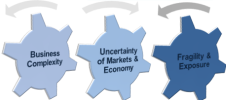Duncan Watts [presentation]:: The Myth of Common Sense
Wednesday, 8 August, 2012
Duncan Watts is a clever guy! Not just because he is well educated, which he undoubtedly is but because he has the ability to explain why “common sense” works in the appropriate domain(s) – simple, maybe even complicated – but is particularly dangerous in complex or chaotic domains. But, then again, that is what this definition tells us: “sound and prudent judgment based on a simple perception of the situation or facts“. But when I talk about these different domains you should not visualise this as “islands” or separate entities. Rather, as various “conditions” or “states” that can be found within a single complex [adaptive] system, its sub-systems and networks at any given time, as it performs the many inter-connected processes that underpin functionality.
Why is this relevant? Because “common sense” isn’t much use if you are dealing with a system so complex that you CANNOT understand its complexity, track causality or anticipate the unintended outcomes (or unintended consequences)! Where the smallest decisions can have enormous consequences and the smartest decisions can be counter-intuitive, how can they be validated when the crowd advocate “common sense”???
I urge you to watch the presentation (even read the book!) and, if this has whetted your appetite, you may also be interested in what Atul Gawande has to say about surgeons dealing with complexity, Tim Harford talking about Oil Rigs or Dave Snowden a kids party!
Social problems…must be viewed not as the subject of rhetorical debates, but as scientific problems, in the sense that some combination of theory, data, and experiment can provide useful insights beyond that which can be derived through intuition and experience alone.
Freakonomics » The Myth of Common Sense: Why The Social World Is Less Obvious Than It Seems.
Too often we are guilty of over-estimating our own knowledge and underestimating what appears familiar even though we know that appearances can be deceptive – some “creatures” are particularly adept at exploiting this knowledge – and how much we have learnt by looking deeper (into space) or more closely (DNA, bacteria). Living systems come in all shapes and sizes but their true nature and an understanding their “structure” cannot be ascertained without observation at a variety of scales.











